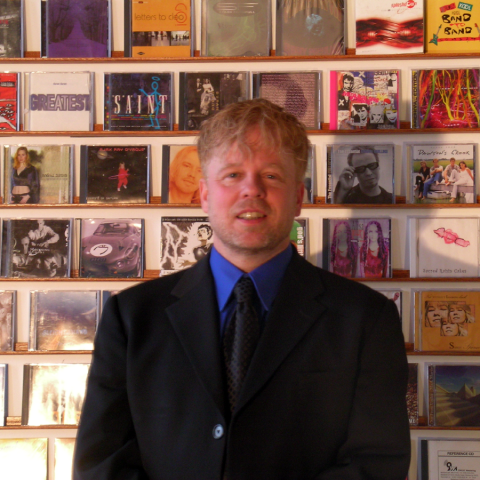Alumni Profile

Anthony J. Resta '80
Conventional wisdom states that if you want to be in the music business, you should probably go where the business is. Producer Anthony Resta, whose réesumé lists work for major labels (EMI and Sony) and major artists, such as Duran Duran, Elton John, Collective Soul, and many more, resisted that trend and has a burgeoning career in Westford, Massachusetts as a result. "There was a management company that was urging me to move to Los Angeles," says Resta. "I know I'd make a lot more money there, but money is only one part of life. I am a hard-core New Englander. I love the change of seasons, fishing, and going to the mountains in Vermont."
Maybe the idea of putting down roots and building his 3,500-square-foot recording facility, Studio Bopnique Musique, in a desirable non-urban location is a reaction to the many moves Resta's family made when he was young. His father was a geophysicist, and at various times the family pulled up stakes to go to Australia, Texas, and New England. Most summers were spent in Swift Current, Saskatchewan.
Ironically, for a guy who has made his living producing rock and pop tracks, Resta, who began his musical journey as a drummer in third grade, was a jazzer at the outset. "My mother was into jazz, and I listened to jazz quite a bit," Resta says. "When I came to Boston, I studied with [jazz drummer] Alan Dawson. However, in my teen years I started really tuning into rock."
After finishing high school, Resta enrolled at Berklee hoping to become a great performer. After taking a few electronic music and music synthesis courses, another passion surfaced. A fascination with electronic gear and the possibilities for manipulating sound piqued his interest. Looking around Resta's Studio Bopnique these days almost produces a sensory overload when one surveys the vast array high-tech and decidedly low-tech gear that fills the huge brick-walled space. He has collected devices that many would prize (Mac and IBM computers running Pro Tools, Sonic Foundry, and various sequencing programs, and an array of great mics, vintage guitars, drums, and synthesizers). There are other devices and instruments that might not get a second look at a yard sale though. I'm thinking of the Tolex-covered phonographs built for playing 45s and weird keyboards on spindly wooden legs with 24 little keys and accordion buttons for the left hand. As they say, one man's trash is another man's treasure and any little oddity in Resta's arsenal just might find its way onto a recording.
Part of what brings clients to Resta's door is his gift for blending this old and new technology with stunning results. His solid musical abilities on several instruments and vocals and a truly limitless imagination are what got the attention of members of Duran Duran, the first major act to hire Resta.
The connection grew after Resta wrote songs with Missing Persons vocalist Dale Bozzio circa 1986. He sent some of the songs to former Missing Persons guitarist Warren Cuccurullo, who had begun working with Duran Duran. On the flip side of the demo, Resta included material by his alter ego Ajax Rayovac, who reads poetry over electronic soundscapes. "I had been experimenting with subharmonics and some of my relic equipment," says Resta. "Warren heard it and really liked it and decided to give me a shot at a mix. He told me not to get my hopes up, but to give it a try. I started out mixing it like a Duran Duran tune before it occurred to me that Warren didn't want me to make it sound like that; he liked the crazy stuff on my poetry album. I started replacing the heavy guitars with tracks of people blowing into conch shells and added a crazy-sounding cowgirl vocal melody to one section. I also replaced Steve Ferrone's drum parts with my own - I figured I'd just go for it. A few days after I sent it off, I got a call from Simon Le Bon, saying, 'Lad, you're mad. We've got to get you over here!'
"That started a relationship that lasted from 1994 to 1998 and included work on 30 songs with the band. They gave me a shot when nobody else knew who I was, and it opened all kinds of doors for me."
Since then, Resta's projects have been many and varied. He's also added to his staff, hiring engineer Karyadi Sutedja '98 and assistant Matt Girard. Studio Bopnique's credits include projects for Blondie, Megadeath, Guster, Def Jam, Letters to Cleo, Mudhens, and others (visit www.studiobopnique.com for more). A recent project for the soundtrack of the Ken Burns film Unforgivable Blackness, which chronicles the life of boxer Jack Johnson, drew on Resta's skills as a percussionist.
The film's composer, Yale Beebee, was having trouble with a piece of traditional Cuban music and was referred to Resta. "In editing the music to the picture, the film editors inadvertantly destroyed the clavé by creating bars of 11/16 and 11/8," Resta says. "Yale wanted to compose a piece in a traditional style with those time changes to fit the picture. I played percussion on it while he conducted me. The track is about four minutes long and runs under a pivotal scene in the film portraying Johnson's 1915 fight in Havana."
While any type of project is likely to end up on Resta's desk, he looks for songs and artists he really wants to work with. "I love working with singer/songwriters because I get a chance to be really involved," says Resta. "I've just signed a publishing deal with Universal, and I will be doing a lot more writing. I'm hoping that in the next five years, writing will take up 30 percent of my time, production 30 percent, artist development, 10 percent. The remaining 30 percent I hope to spend fishing for striped bass."




